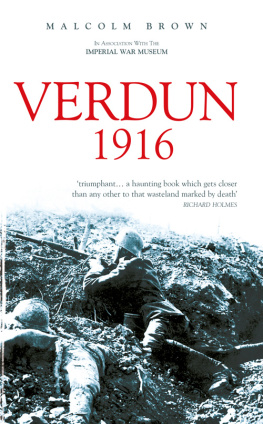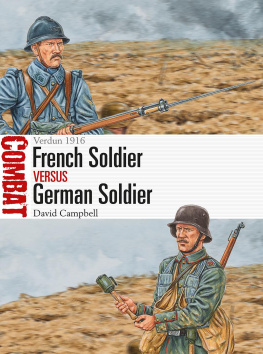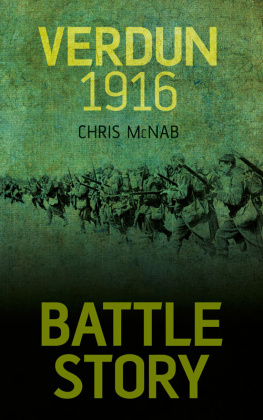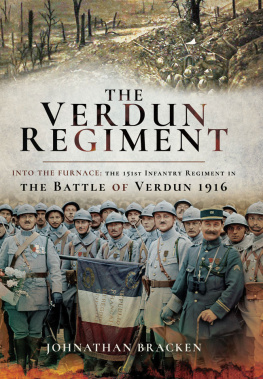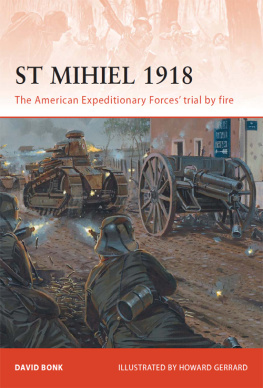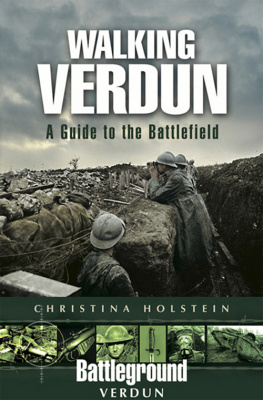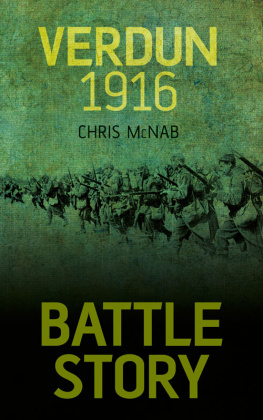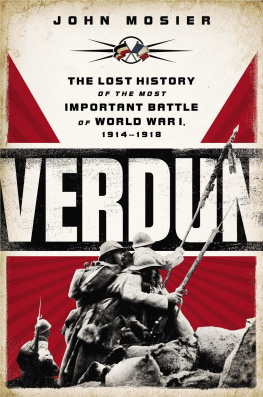1
Certain places are fated to be permanently marked by what happened in them or in their vicinity at one particular moment of history. The name is enough: mention it and the connotations gather around, the reputation clicks instantly into place. The twentieth century was rich in such names and in its own particular category Verdun stands high. The battle to defend that garrison town in north-eastern France from 21 February to 18 December 1916 has become a symbol almost without parallel of the awfulness of modern industrialised conflict. Perhaps only Stalingrad, famous for the six-month-long siege-battle in Soviet Russia which became the turning point of the Second World War, can invite serious comparison. So much was implicitly acknowledged by the man who more than anyone caused the Stalingrad dbcle, Adolf Hitler, when in November 1942 he assured his Nazi Old Guard in a speech at Munich that it would never become a second Verdun. It did, with himself and his country as the losers.
Verdun had its Russian connotations even while the battle was being fought. The German Supreme Commander on the Russian Front (himself to be closely associated with Hitlers rise to power) was General Paul von Hindenburg. He would later write:
Verdun! The name was continually on our lips in the East from the beginning As time went on doubts gradually began to prevail, though they were but seldom expressed. They could be summarised shortly in the following question: Why should we persevere with an offensive which exacted such frightful sacrifices and, as was already obvious, had no prospects of success?
The Russians allies of France and Britain at this time, their withdrawal from the war under Lenin still almost two years away looked on the French response to the German attack on Verdun with something approaching awe. M. Maurice Palologue, the French ambassador at the court of the Tsar, had been aware that for some time the Russian people had tended to sneer at the French contribution to the war. Now he sensed a different mood. The Battle of Verdun, he noted in his diary as early as 28 February, has changed all that. The heroism of our army, the skill and coolness of our High Command, our enormous resources in matriel and the splendid attitude of our public opinion are admired by everyone.
Britain also watched with admiration, if with frustration in military circles because 1916 was meant to be the year of a great AngloFrench offensive, not a German one. The intended attack went ahead, if with reduced French participation. It became known as the Battle of the Somme, itself a kind of Verdun replica, not dissimilar in level of sacrifice if fortunately shorter in duration.
For the French, Verdun would become a lasting symbol. When Henry Bordeaux, who doubled as soldier and patriotic writer, produced the first of his two books about the battle, The Last Days of Fort Vaux published in 1917 he began his Preface with the paragraph:
VERDUN those two syllables that have already become historic ring out today like the brazen tones of a trumpet. In France, no one can hear them without a thrill of pride. In England, in America, if any speaker utters them, the whole audience rises as one man.
If one were to nominate a British parallel, it would not be associated with the Somme, but with that other sector of the former Western Front where the British have long had a special link, Flanders, where between 1914 and 1918 there took place no fewer than four Battles of Ypres. The city of Ypres, determinedly defended with the kind of they shall not pass mentality which pertained at Verdun, is the only possible British equivalent. In August 1915, a young British private, Rifleman P.H. Jones of the Queens Westminster Rifles, wrote in his diary:
One feels that this City of the Dead is infinitely greater, infinitely more sublime in the hour of its ruin than it could ever have been in the past. It seems to be a symbol, not only of the mad destruction against which we are fighting but also of the ideals for which we struggle. We hold this place for moral effect only (our troops would be better off behind the Canal) for an ideal, in short. We have paid a heavy price for our ideal, two great battles and Heaven knows how many more to come. There is nothing sordid in this place, in holding it men have died for a dream, sacrificed themselves for a heap of ruins.
The French would have recognised such sentiments for they reflect what they themselves felt instinctively in relation to Verdun. There was, however, a major difference. The British were fighting abroad. The French, like the Belgians, were fighting on their own ground, their patrie . More, substantial areas of that patrie were under occupation. As far back as the first weeks of the war a British cavalry officer, Captain E.W.S. Balfour, Adjutant of the 5th Dragoon Guards, had sensed the fury his allies felt at the loss of so much territory to the enemy. In a letter to his family he wrote:
To the French it is their own home and it makes them mad. We somehow fight on with no increased animosity. If we were ordered to retire again tomorrow, I dont believe we should lose morale. The French really are giving everything and it makes one wonder if people in England realise what the advance of an invading army over a country means.
It was because of such attitudes that when the Germans attacked Verdun in 1916 it was defended in so furious a manner. The French had yielded enough heartland already; to lose more would inflict yet more humiliation. In Balfours phraseology, it made them mad and forced them to give everything rather than concede.
The result was what rapidly became known as the Hell of Verdun. Significantly the most famous painting of the battle, by Georges Leroux, is called LEnfer : Hell. With its depiction of smoke, fire, mud, shattered trees, and pygmy figures in gas-masks attempting to crawl out of a flooded trench it is almost like a science-fiction version of a Gustave Dor illustration to Dante or a painting by Hieronymus Bosch. Small wonder that Verduns reputation once fixed became so enduring.
There was further fighting there in the following year, if smaller in scale; even the thought of it could act as a reminder of what had happened in the preceding one. In the late summer of 1917 a sixteen-year-old American, Julian Green (born in Paris, with French as his chief language, and a future novelist of distinction), then working as a volunteer ambulance-driver, found himself in the wooded hill country of the Argonne, not many miles from Verdun. Soon after his arrival a fellow member of his unit called him out on to the terrace of the building they were using as a headquarters and invited him to listen, to a low, distant, incessant rumbling. His first thought was that he was hearing a storm. No said his colleague. If it were thunder the noise would stop occasionally. This noise is constant. Its Verdun. Green would write of his reaction:
I shuddered at the mention of this sinister yet fascinating name. There, I knew I really would have been frightened. There, my intestines would certainly have turned to liquid like those of King David in the Psalms. Verdun was a hell, and the noise I heard in the distance was the ghastly rattle of death, the vast black hole where the armies of two nations were being swallowed up. I could not utter a word
How Verdun came to be attacked and how it was defended, and how, against the odds, it has now become a remarkable symbol of international reconciliation is the subject of this book, published at the onset of a century in which it is hoped that such massive human tragedies as those that took place at Verdun, the Somme, Ypres and Stalingrad will join the list of what the poet William Wordsworth called old unhappy far-off things and battles long ago.
2

